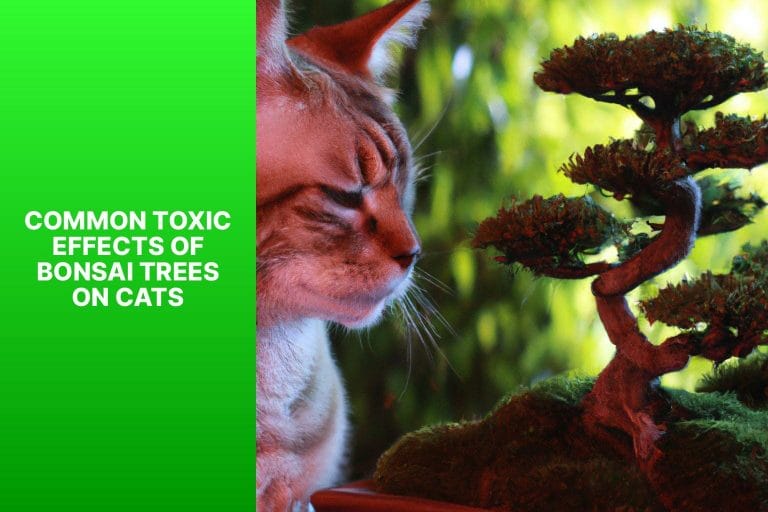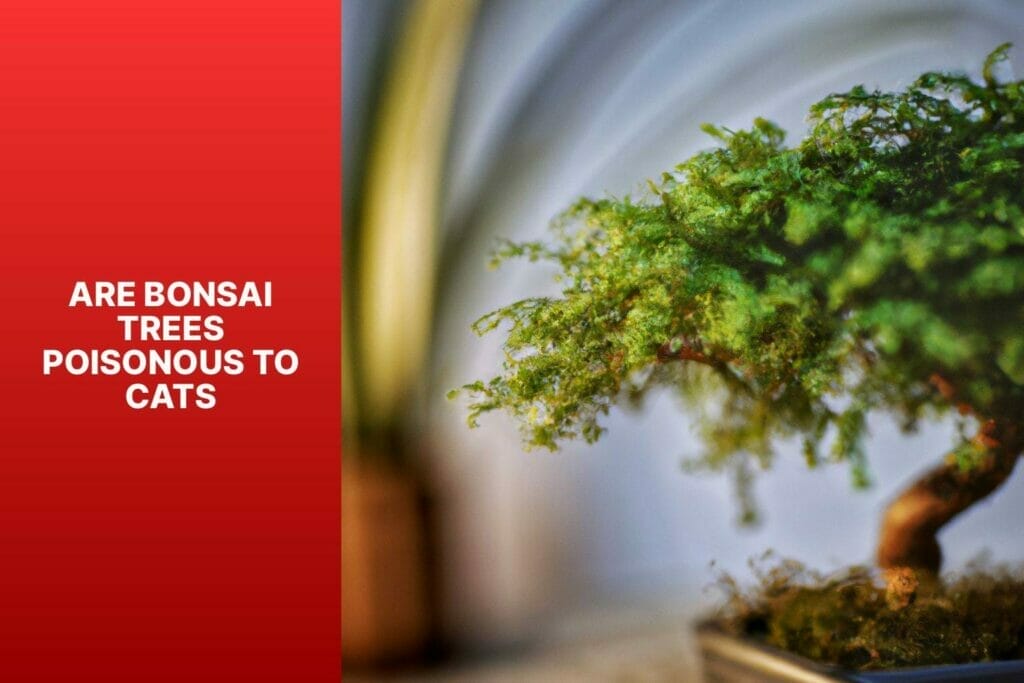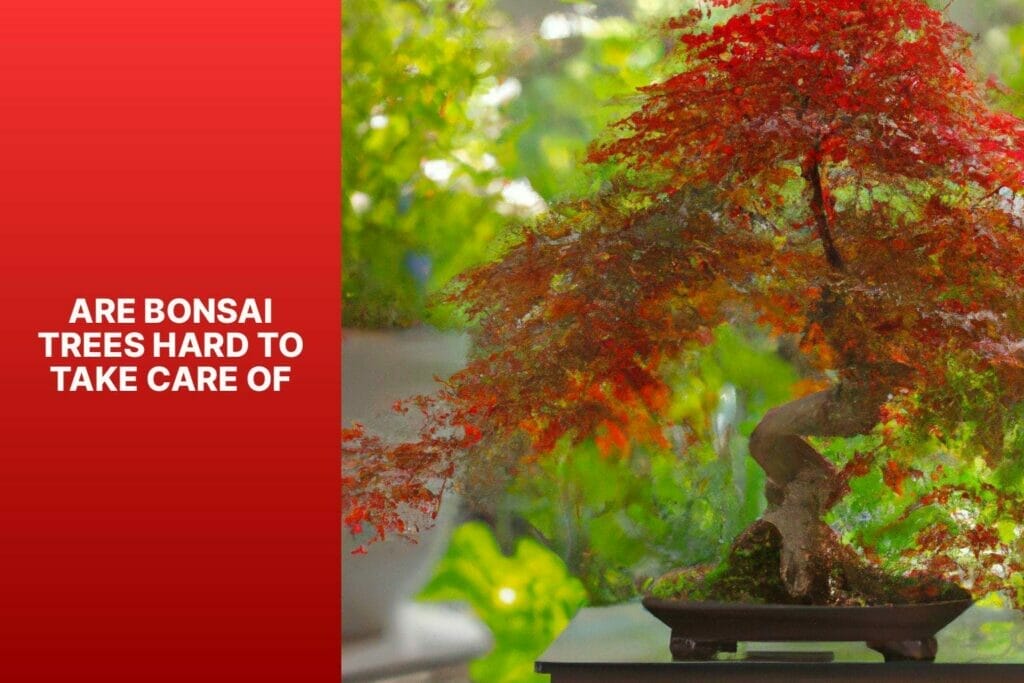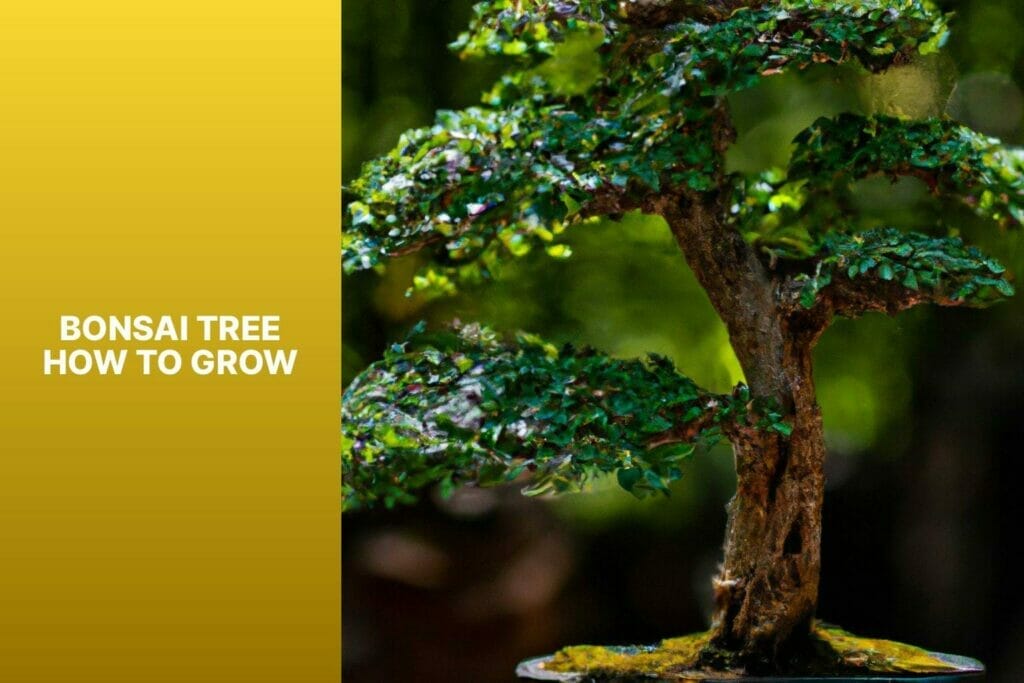Bonsai trees are miniature trees carefully cultivated and shaped to resemble mature trees in nature. They are known for their beauty and artistic appeal, making them a popular choice for plant enthusiasts. Considering their potential toxicity when keeping bonsai trees in households with cats is crucial. This article aims to explore the question, “Are bonsai trees poisonous to cats?” and provide important information and precautions to ensure the safety of your feline companions.
While bonsai trees are generally safe for cats, certain parts of these trees can be toxic and pose a risk to their health. It is important to be aware of the specific parts that can cause harm if ingested by cats.
Some common toxic effects of bonsai trees on cats include gastrointestinal issues, such as vomiting and diarrhea, as well as potential damage to the liver and kidneys. It is essential to recognize the symptoms of bonsai tree poisoning in cats, including lethargy, difficulty breathing, excessive salivation, and loss of appetite. In severe cases, ingesting bonsai trees can even lead to cat death.
To ensure the safety of your cats around bonsai trees, it is important to take certain precautions. This includes choosing non-toxic bonsai tree varieties, as some species can be more harmful to cats than others. Placing bonsai trees in safe areas where cats cannot access them and training cats to avoid interaction with the trees can also help prevent potential accidents.
In the unfortunate event that a cat ingests bonsai trees, it is crucial to act quickly. Recognizing the signs of bonsai tree poisoning in cats is important, and immediate veterinary attention should be sought. Contacting a veterinarian immediately and following their emergency care instructions is essential to ensure the best possible outcome for your cat.
By understanding the potential toxicity of bonsai trees to cats and taking the necessary precautions, you can enjoy these beautiful trees in your home while keeping your feline friends safe and healthy.
Key takeaway:
- Bonsai trees can be toxic to cats: Certain parts of bonsai trees, such as the leaves, berries, or bark, can be poisonous to cats. It is important to know these toxic effects to keep cats safe.
- Potential toxic effects on cats: Ingesting bonsai trees can lead to various symptoms, such as gastrointestinal upset, drooling, vomiting, or even death. Recognizing the signs and seeking immediate veterinary care is crucial.
- Precautions to protect cats: Choose non-toxic bonsai tree varieties, place bonsai trees in safe areas inaccessible to cats, and train cats to avoid them. These precautions can help prevent accidental ingestion and potential poisoning.
Are Bonsai Trees Poisonous to Cats?
Bonsai trees can be toxic to cats if ingested. Some species of bonsai trees contain compounds harmful to cats in large quantities. These compounds include alkaloids, glycosides, and essential oils, which can cause gastrointestinal upset, vomiting, diarrhea, and organ damage in severe cases. Not all bonsai trees are toxic to cats, but it’s best to keep them out of reach as a precaution.
A friend of mine had a bonsai tree in her home, along with a curious cat. One day, she found the bonsai tree knocked over and the leaves scattered on the floor. Worried about her cat’s health, she called the veterinarian, who advised her to monitor her cat for signs of illness. Fortunately, the cat showed no symptoms and recovered fully. From then on, she kept the bonsai tree securely away from her curious feline companion. It taught her an important lesson about the potential dangers of certain plants and the importance of creating a safe environment for pets.
What Parts of Bonsai Trees Can Be Toxic to Cats?
The leaves, flowers, stems, and bark of bonsai trees can be toxic to cats. Cats may chew or nibble on these parts, which can cause potential toxicity. Certain species of bonsai trees contain compounds harmful to cats if ingested.
Some bonsai tree leaves, such as Azalea and English Ivy, contain toxins that can cause gastrointestinal upset, including vomiting and diarrhea in cats. Ingesting flowers from trees like Sago Palm and Oleander can be more dangerous, as they contain toxins that can affect the heart and nervous system, potentially leading to severe symptoms.
Stems and bark from species like Ficus and Jade plants also contain toxic substances that can cause cat digestive issues. It is important to note that the toxicity levels may vary depending on the specific bonsai tree type and the amount consumed.
To ensure your cat’s safety around bonsai trees, keep them out of reach and monitor their interactions with plants. If you suspect your cat has ingested any part of a toxic bonsai tree, contact a veterinarian immediately for guidance and possible treatment. Remember, it is always better to prevent potential toxicity by choosing non-toxic bonsai tree varieties and creating a safe environment for your cat.
Common Toxic Effects of Bonsai Trees on Cats

Photo Credits: Mnbonsainetwork.Com by Ronald Rodriguez
Bonsai trees can have common toxic effects on cats, including vomiting, diarrhea, and gastrointestinal irritation. Some bonsai trees contain compounds that can affect a cat’s central nervous system, resulting in drooling, tremors, and seizures in severe cases.
To ensure your cat’s safety keeping bonsai trees out of their reach is important to ensure your cat’s safety. If you notice any unusual symptoms or suspect that your cat has ingested any part of a bonsai tree, it is crucial to contact your veterinarian immediately.
Avoiding toxic plants like bonsai trees in your home is recommended to prevent such incidents. Instead, opt for cat-safe alternatives such as spider plants or catnip. Taking proactive measures and being mindful of the potentially toxic effects can create a safe and healthy environment for your beloved feline companion.
What Are the Symptoms of Bonsai Tree Poisoning in Cats?
The symptoms of bonsai tree poisoning in cats can vary depending on the type of tree and ingested parts.
Common symptoms include vomiting, diarrhea, loss of appetite, lethargy, depression, drooling, difficulty breathing, increased heart rate, and seizures in severe cases.
If you notice these symptoms in your cat, seek immediate veterinary attention for appropriate treatment.
To prevent bonsai tree poisoning, keep these plants out of reach and train cats to avoid them.
Being aware of symptoms is vital for cat safety and well-being-.
Precautions and veterinary care can protect cats from the harmful effects of ingesting bonsai trees.
Can Ingesting Bonsai Trees Cause Death in Cats?
Can ingesting bonsai trees cause death in cats? Ingesting bonsai trees can indeed be fatal to cats. Cats are often attracted to the appealing foliage and berries of bonsai trees. Certain species of bonsai trees contain toxic compounds that can harm cats if consumed in large amounts.
The toxicity effects of bonsai trees on cats depend on the species and parts of the tree that are ingested. Common toxic effects include gastrointestinal upset, vomiting, diarrhea, difficulty breathing, and organ failure. The severity of these symptoms can vary depending on the amount ingested and the cat’s sensitivity.
If a cat ingests a poisonous bonsai tree, it is crucial to seek immediate veterinary assistance. Contacting a veterinarian is essential as they can provide appropriate guidance and treatment to help mitigate potential harm. Quick action can often significantly affect the cat’s chances of recovery.
Keeping cats away from bonsai trees is advisable to prevent such incidents. This can be done by placing the bonsai trees in safe and inaccessible areas, training cats to avoid them, or choosing non-toxic varieties. By taking these precautions, you can ensure the well-being and safety of your feline companions.
Cats are curious, so it is vital to safeguard them from potential dangers.
Precautions to Keep Cats Safe Around Bonsai Trees
Discover practical measures to ensure the safety of your feline friends when it comes to bonsai trees. Learn about non-toxic bonsai tree varieties, strategic placement to prevent access, and even training techniques to encourage cats to avoid these delicate miniatures. By implementing these precautions, you can create a harmonious environment where your love for bonsai trees and your cats can coexist happily.
Choosing Non-Toxic Bonsai Tree Varieties
When choosing non-toxic bonsai tree varieties for your home, consider the following options:
– Ficus bonsai tree: Safe for cats, they are popular for their beautiful aerial root systems and glossy leaves.
– Money tree: Also known as Pachira aquatica, money trees have braided trunks, making them a unique and safe choice.
– Jade tree: Crassula ovata, or jade tree, is a non-toxic bonsai variety with thick, oval-shaped leaves that are easy to care for.
– Hawaiian umbrella tree: Schefflera arboricola, commonly known as the Hawaiian umbrella tree, is safe for cats and has glossy, dark green leaves resembling an umbrella.
– Japanese maple: Acer palmatum, or Japanese maple, is a safe and beautiful choice for a bonsai tree with vibrant foliage and an elegant branching structure.
These non-toxic bonsai tree varieties not only add beauty and charm to your space but also ensure the safety of your feline friend.
Placing Bonsai Trees in Safe Areas
When placing bonsai trees in safe areas, follow these steps to ensure your cat’s well-being:
- Choose an elevated location: Place the bonsai tree on a high shelf or table out of your cat’s reach. This prevents them from accessing the tree and causing harm.
- Secure the tree: Use a sturdy, heavy pot or container to hold the bonsai tree. This prevents it from tipping over if your cat tries to jump onto the surface.
- Create a barrier: Surround the bonsai tree with a physical barrier, such as mesh or a fence. This deters your cat from getting too close, knocking it over, or nibbling on its leaves.
- Avoid toxic plants: Make sure your bonsai tree is non-toxic to cats. Research the specific species and verify its safety for feline companions.
- Keep the area clear: Remove any other objects or plants that may entice your cat into the same area. This redirects their attention from the tree and prevents accidents or damage.
By taking these precautions and placing bonsai trees in safe areas, you can protect your cat and create a harmonious environment for your pet and your cherished plants.
Training Cats to Avoid Bonsai Trees
– Use deterrent sprays: Spray a cat-safe deterrent around the bonsai tree’s base to discourage cats from approaching it.
– Provide alternative scratching surfaces: Offer scratching posts or boards near the bonsai tree to redirect the cat’s urge to scratch.
– Use physical barriers: Place a temporary fence or baby gate around the bonsai tree to prevent cat access.
– Utilize motion-activated devices: Set up motion-activated devices like ultrasonic repellents or sprinklers to startle cats and discourage them from approaching the bonsai tree.
– Implement positive reinforcement training: Reward cats for avoiding the bonsai tree with treats or praise, creating a positive association.
– Employ negative reinforcement training: Startle cats with noise-making devices or compressed air cans whenever they approach the bonsai tree, teaching them to associate it with unpleasant experiences.
– Provide interactive toys: Engage cats in playtime and interactive activities to keep them mentally and physically stimulated, reducing their interest in the bonsai tree.
– Redirect attention: Whenever cats show interest in the bonsai tree, redirect their attention to more appropriate toys or activities.
– Use unpleasant smells: Cats dislike certain smells like citrus or vinegar. Applying these scents near the bonsai tree can help deter them.
– Ensure a safe environment: Remove any toxic plants from the cat’s reach and keep the bonsai tree in a secure location inaccessible to cats.
What to Do If a Cat Ingests Bonsai Trees?
If your feline friend has had an unexpected encounter with a bonsai tree, it’s important to know what steps to take next. This section explores what to do if a cat ingests bonsai trees. From recognizing the signs of bonsai tree poisoning to contacting a veterinarian immediately and following emergency care instructions, we’ll cover all the essential information to ensure your cat’s well-being in this unusual situation. So let’s dive in and discover how to handle this potential hazard with your furry companion!
Recognize the Signs of Bonsai Tree Poisoning
Unusual behavior: Excessive drooling, vomiting, diarrhea, or lack of appetite are all potential signs of bonsai tree poisoning in cats.
Difficulty breathing: Wheezing, coughing, or rapid breathing could be indications that a bonsai tree has poisoned a cat.
Physical symptoms: Pay attention to skin rashes, swelling, redness, or irritation, which may indicate a negative reaction to bonsai tree toxins.
Gastrointestinal issues: Cats may experience abdominal pain, cramping, or discomfort after ingesting a toxic part of a bonsai tree, and they may also have difficulty passing stool.
Neurological symptoms: Look out for seizures, tremors, disorientation, or loss of coordination, as these can be signs of bonsai tree poisoning in cats.
These signs should never be ignored as they indicate potential poisoning and require immediate veterinary attention. It is crucial to recognize these symptoms to ensure timely care and treatment for your cat.
Contact a Veterinarian Immediately
If you suspect that your cat has ingested bonsai trees, it is crucial to contact a veterinarian immediately. Taking prompt action can prevent any harm to your cat. Follow these steps:
- Observe your cat for any signs of bonsai tree poisoning, such as vomiting, diarrhea, drooling, lethargy, or difficulty breathing.
- Contact a veterinarian immediately if you notice these symptoms or suspect your cat has ingested the trees. Seek professional advice to assess the situation and determine the best action.
- When contacting the veterinarian, provide specific details about the bonsai trees your cat may have ingested, including the species and any available information.
- It is important to follow the veterinarian’s instructions carefully. They may advise you to monitor your cat at home, bring them in for an examination, induce vomiting, or administer specific treatments based on the severity of the situation.
- If your regular veterinarian is unavailable, it is essential to contact an emergency veterinary clinic or animal poison control hotline for immediate guidance.
Remember, prompt contact with a veterinarian is vital for the well-being and health of your cat if bonsai tree ingestion is suspected.
Follow Emergency Care Instructions
Stay calm and assess the situation. Carefully remove any remaining parts of the bonsai tree from your cat’s mouth, if possible.
Check your cat’s breathing and heart rate. If your cat has difficulty breathing or is distressed, seek immediate veterinary attention.
If your cat behaves normally, watch for signs of poisoning, such as vomiting, diarrhea, or excessive drooling. Contact a veterinarian immediately to inform them of the situation and ask for guidance.
Follow any instructions from the veterinarian, such as inducing vomiting or giving activated charcoal. Do not give any medications or treatments without professional guidance.
Provide the veterinarian with relevant information, including the type of bonsai tree and any symptoms your cat may have.
Monitor your cat’s condition closely and follow up with the veterinarian as recommended. Remember to follow emergency care instructions.
Some Facts About Are Bonsai Trees Poisonous to Cats:
- ✅ Most bonsai trees are poisonous to cats if ingested, causing shock or death. (Source: bonsaistarter.com)
- ✅ Bonsai trees contain toxins that can harm cats, such as cycasin found in Sago Palm bonsai trees. (Source: bonsaistarter.com)
- ✅ Symptoms of poisoning in cats include skin irritation, coughing, lethargy, increased urination and water intake, breathing problems, dilated pupils, vomiting, tremors or seizures, shivering, slow heart rate, diarrhea, gastrointestinal irritation, black stool, and depression. (Source: bonsaistarter.com)
- ✅ Some common poisonous bonsai trees for cats include Sago Palm, Chinese Rubber Plant, Fig, Azalea, and Plum. (Source: bonsaistarter.com)
- ✅ Non-toxic bonsai trees safe for cats include Prayer Plant, Juniper, Hibiscus, Japanese Palm Tree, Christmas Cactus, Bamboo Palm, Peperomia Green, Money Tree, Parlour Balm, and Carmona. (Source: bonsaistarter.com)


